Your baby needs to get all the right nutrients from what you eat, so you better watch your diet. A good pregnancy diet is very similar to a regular healthy diet. It must be complete, balanced, and varied. But also, it must include a good amount of some elements like iron, folic acid… And of course, it must be free of others like raw meat, unpasteurized cheese…
What are the extra requirements in your pregnancy diet?
If we compare it to a non-pregnant woman, your diet should include some extra:
Calcium: Calcium is a basic component of bones and teeth, both for you and your baby. To ensure good development you should take around 1000 mg of calcium a day. Vitamin D is also important because it helps your body absorb that calcium, so don‘t forget to get some sun. Some foods high on calcium are: milk and other dairies, sardines and salmon. Remember to have pasteurized dairies only (unpasteurized can transmit Listeria)
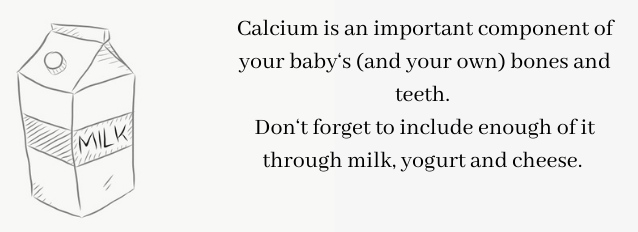
Folic acid: It’s a B vitamin that helps prevent spina bifida and other birth defects. It’s difficult to get all the recommended folic acid from your diet, so most doctors prescribe some folic acid supplements to pregnant women. They usually recommend 400 micrograms/day before getting pregnant (while you are trying to get pregnant) and 600 micrograms/day during pregnancy. Some foods with folic acid are leafy greens like spinach, beet and fortified cereals, bread, pasta…
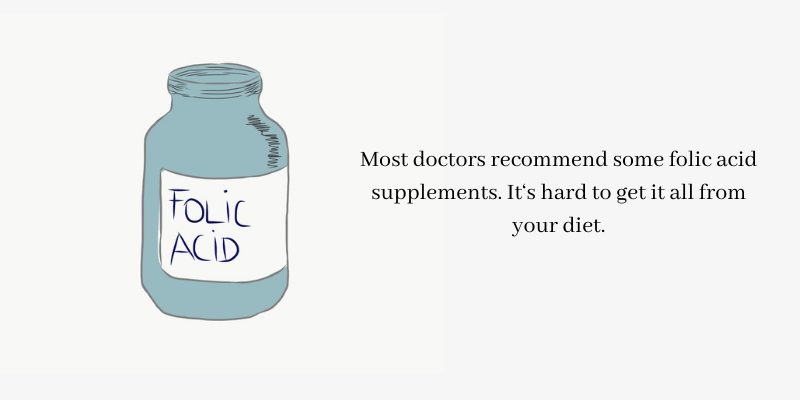
Iron: Pregnant women require twice as much iron than non-pregnant women, around 28 mg per day. It prevents of iron-deficiency anemia, which is quite frequent during pregnancy. Vitamin C helps your body absorb iron the same way that Vitamin D helped with calcium. So make sure to incluido some oranges, too. Some foods with iron are red meat, poultry, fish, beans…
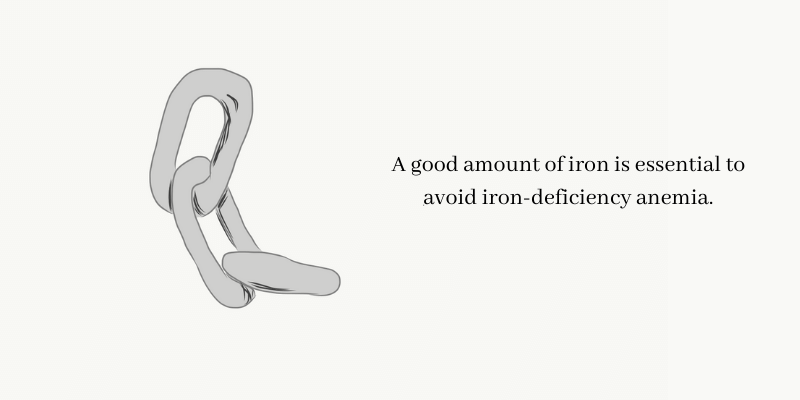
Protein: it’s not so common to get short on protein during pregnancy if your diet is balanced. If you are a vegetarian or vegan remember to take enough protein from legumes, tofu… Proteins are “the bricks” with which almost everything is built in our bodies. Some protein-rich foods are read meat, poultry, fish, beans, eggs, tofu…
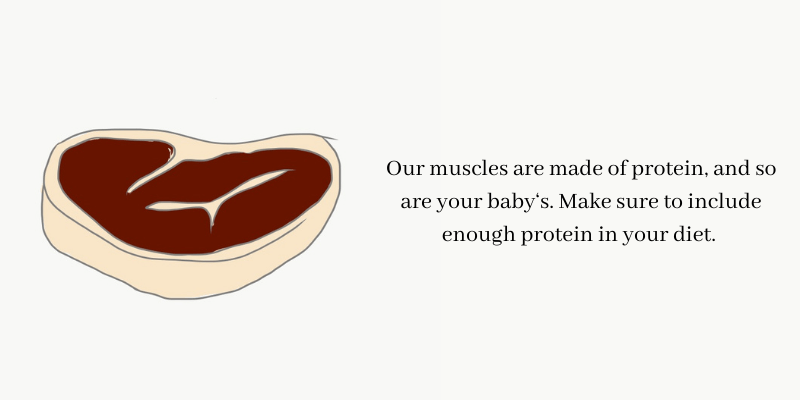
What to eat
You can include the following types of food to make sure you don’t get short on the essential nutrients. The main food groups are:
Fruits and vegetables: they have plenty of vitamins and fiber. Fiber will improve your transit and help with constipation (quite common during the third trimester when the baby is so large it compresses everything around him).
Protein sources: there are many animal and vegetable options to choose from. Red meat, chicken, fish, eggs, tofu, cheese (make sure it’s pasteurized), milk…
Whole Grains: they are a very important source of energy due to the high amount of carbohydrates they have. Make sure you include some such as oatmeal, whole-wheat pasta, brown rice…
Dairies: they will provide you with the calcium you need. They include milk, yogurt, cheese… Remember to avoid unpasteurized products, as they can transmit Listeria.
Supplements: most pregnant women have to take iron and folic acid supplements. They help prevent iron-deficiency anemia on the mother (iron) and neural tube defects on the baby (folic acid). Your doctor will prescribe them.
What to avoid
Alcohol: yes, you must avoid alcohol during pregnancy. Alcohol consumption can cause fetal alcohol syndrome. The baby will develop physical malformations as well as some degree of mental retardation.
Unpasteurized dairies: that includes some cheeses like feta, Brie, Camembert… Unpasteurized dairies can transmit Listeria. Listeria causes an infection that is pretty harmless for an adult but really dangerous for the baby. It can cause miscarriage, preterm labor, and death of the newborn. To read more about it, read our post: Pregnancy Complications: When Things Go Wrong.
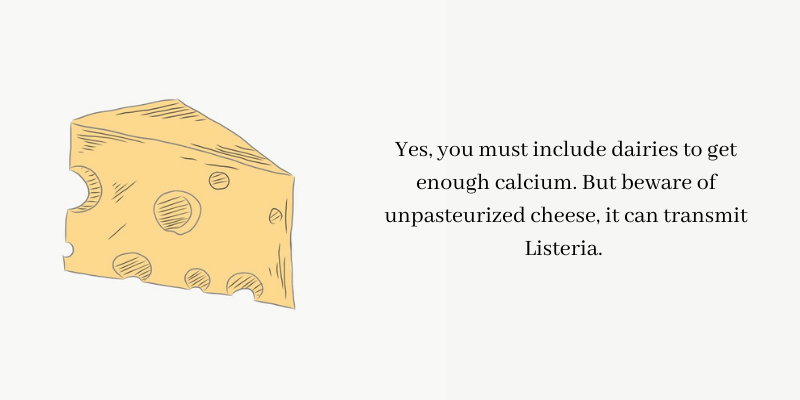
Undercooked meat and fish: in this case, there is a risk of getting Toxoplasmosis. Again, it’s harmless for an adult but lethal for the baby. Toxoplasma can also be acquired through cat feces, so it’s also a good idea to stay away from them if possible.
Fish with high mercury content: for example shark, swordfish, marlin… They have high levels of mercury, so it’s better to at least reduce them. A lot of mercury in your organism can be harmful for your baby as it can enter his nervous system and accumulate there, causing brain damage, deafness, and blindness. It’s okey to eat them, just not in huge quantities.
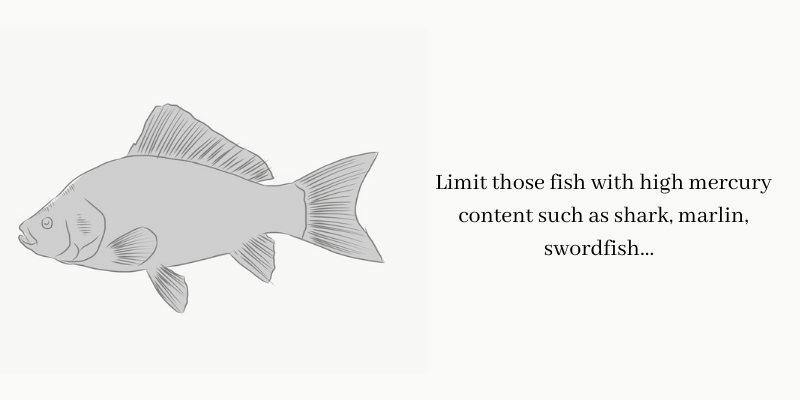
Caffeine: you can still drink coffee but to a limit. It‘s recommended to consume less than 200 mg of caffeine a day, which is equivalent to one cup of coffee a day.

Some things you can experience
· Morning Sickness
We call it morning sickness but the name is not 100% accurate, as it can happen at any time of the day. It is typical of the first trimester. Then, it starts getting better (if not, watch out for hyperemesis gravidarum). You will feel nausea and may even vomit. Also, you’ll lose your appetite. If you suffer morning sickness, try to eat small pieces of food and choose food that is not very spicy nor smelly.
· Food Craving
You will suddenly feel like eating a particular food, maybe even one you weren’t very fond of before. The opposite can also happen and you can suddenly despise some odors or foods. Sometimes, craving is the way your body tells you that you need a certain nutrient, like water if you feel thirsty, or sugar if you crave chocolate.
· Eating For Two
Yes, you have an extra person inside… But your baby barely weighs a couple pounds. So you don’t need to literally eat twice as much. Instead, you should add 200 extra daily calories during the second trimester and 300 calories during the third trimester. During the first trimester the baby starts to form. Then in the 2nd and 3rd trimesters, the baby will increase in size and weight, which is when you’ll need those extra calories.
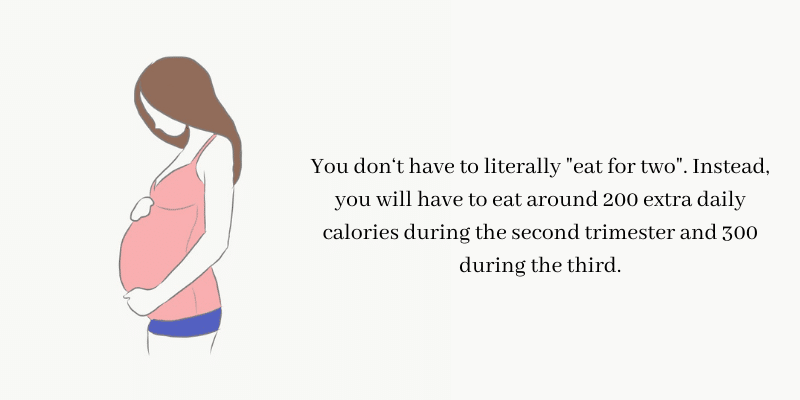
Normal weight gain during pregnancy
Don’t obsess over how much weight you put on. It depends a lot on each individual case. Some women get swollen with edema (water), others really gain some fat, and of course, the baby is also growing inside and increasing the overall weight. If you tend to accumulate fluid on your legs (edema), then you will gain more weight than usual. But that doesn’t mean that the baby is bigger than normal or that there is something wrong going on.
A pregnant woman usually gains between 1 and 4.5 pounds (0.5-2 kg)during the first trimester. Then, around 1 pound (0.5 kg) per week during the second and third trimester. That would be a total of 25 to 35 pounds (11-16 kg).
How To Calculate Your BMI (Body Mass Index)
One easy way to calculate it is the following: you take your weight in kg and divide it into your height (m) squared.
For example, if your weight is 65 kg and your height is 1.62 cm then your BMI would be:
BMI = 65 / (1.62)2 = 24.7
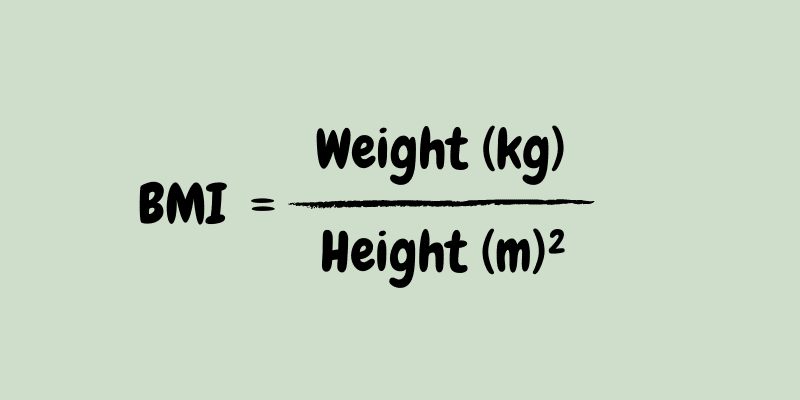
Leave a Reply